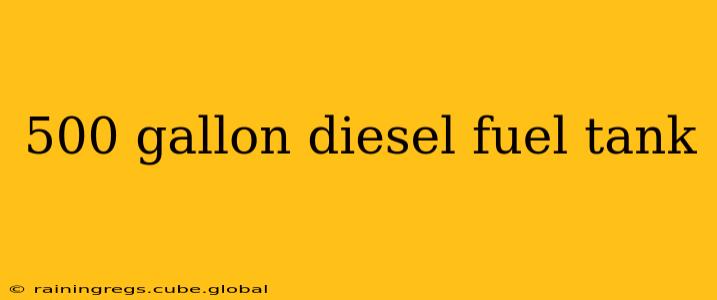Choosing the right 500-gallon diesel fuel tank is a significant decision for businesses and individuals requiring substantial fuel storage. This comprehensive guide explores various aspects to consider, ensuring you make an informed choice that meets your specific needs and budget. We'll cover everything from tank types and materials to installation and maintenance, addressing common questions and concerns.
What are the Different Types of 500-Gallon Diesel Fuel Tanks?
500-gallon diesel fuel tanks come in various designs, each with its own advantages and disadvantages. The most common types include:
- Aboveground Tanks: These tanks are installed above ground, offering easy access for filling, monitoring fuel levels, and maintenance. They are generally less expensive to install than underground tanks but require more space.
- Underground Tanks: These tanks are buried underground, saving valuable above-ground space. However, installation is more complex and costly, requiring professional expertise to meet environmental regulations. Regular monitoring and maintenance are crucial to prevent leaks and environmental contamination.
- Double-Walled Tanks: These tanks feature an inner and outer wall, providing an extra layer of protection against leaks and spills. The space between the walls can be monitored for leaks, offering an early warning system. They are typically more expensive but offer significantly enhanced safety and environmental protection.
- Single-Walled Tanks: These tanks consist of a single wall, making them the least expensive option. However, they offer less protection against leaks and environmental contamination. They are less common for larger capacities like 500 gallons due to increased risk.
What Material are 500-Gallon Diesel Fuel Tanks Made From?
The material of your tank significantly impacts its durability, lifespan, and cost. Common materials include:
- Steel: Steel tanks are strong, durable, and relatively inexpensive. They require regular maintenance to prevent rust and corrosion.
- Fiberglass: Fiberglass tanks are lightweight, corrosion-resistant, and relatively easy to install. They are usually more expensive than steel tanks but offer a longer lifespan with less maintenance.
- Polyethylene (Plastic): Polyethylene tanks are lightweight, durable, and corrosion-resistant. They are also a good choice for applications where chemical resistance is important.
How Much Does a 500-Gallon Diesel Fuel Tank Cost?
The cost of a 500-gallon diesel fuel tank varies greatly depending on several factors:
- Tank Type: Underground tanks are typically more expensive than aboveground tanks.
- Material: Steel tanks are generally less expensive than fiberglass or polyethylene tanks.
- Features: Additional features, such as gauges, pumps, and overfill protection, will increase the overall cost.
- Installation Costs: Installation costs can significantly impact the total expense, particularly for underground tanks.
What are the Regulations for Installing a 500-Gallon Diesel Fuel Tank?
Regulations regarding the installation of 500-gallon diesel fuel tanks vary depending on your location. It's crucial to check with your local authorities and environmental agencies to ensure compliance. These regulations often cover aspects like:
- Spill prevention and containment: Regulations will specify requirements for spill prevention, containment, and cleanup.
- Tank location and siting: Restrictions might apply to the location of the tank, based on proximity to water sources, buildings, and other structures.
- Installation requirements: Specific requirements will exist regarding the proper installation of the tank, including backfilling and grounding.
What is the Best 500-Gallon Diesel Fuel Tank for My Needs?
The "best" 500-gallon diesel fuel tank depends entirely on your individual requirements. Consider these factors:
- Budget: Determine your budget before you start shopping.
- Space limitations: Decide whether an aboveground or underground tank is more appropriate for your location.
- Environmental concerns: Prioritize safety and environmental protection by considering double-walled tanks.
- Maintenance requirements: Consider the long-term maintenance needs associated with different tank materials.
By carefully considering these factors, you can choose a 500-gallon diesel fuel tank that provides reliable fuel storage while meeting your specific needs and budget. Remember, consulting with a qualified installer is highly recommended, especially for underground tanks.
